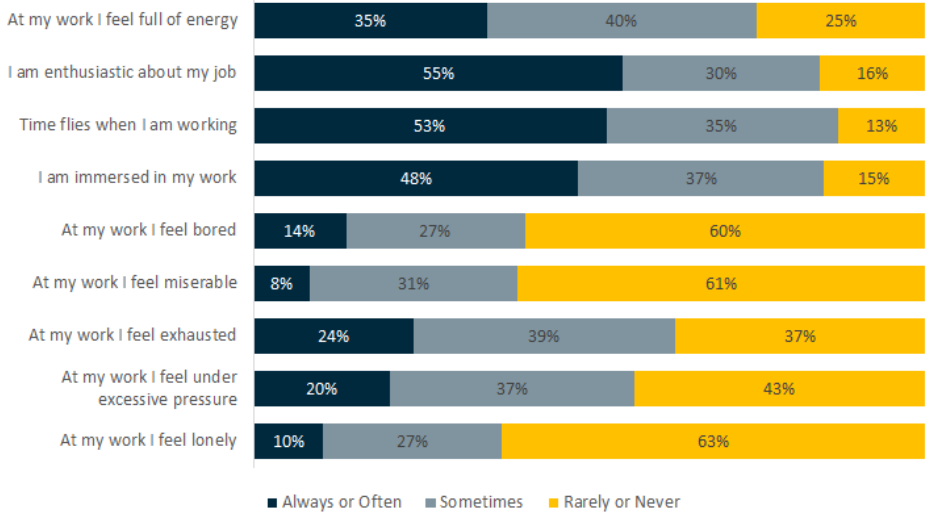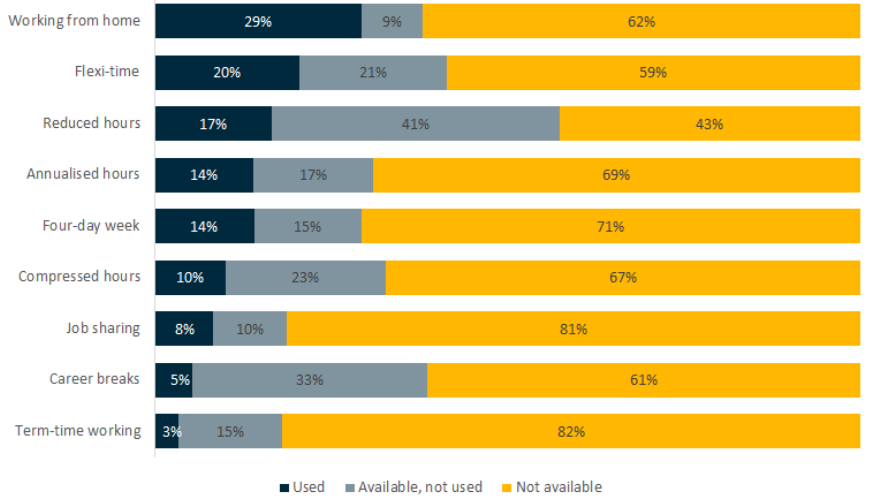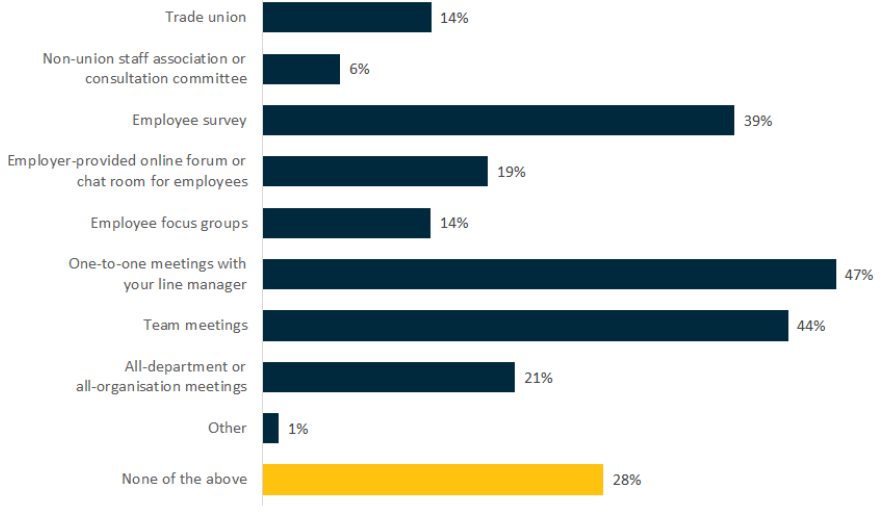
Analysis | Good Work Index 2025 in Northern Ireland
Marek Zemanik, Senior Public Policy Adviser, UK Nations at CIPD, analyses data from the Good Work Index 2025 that demonstrate key trends for workers in Northern Ireland
Marek Zemanik, Senior Public Policy Adviser, UK Nations at CIPD, analyses data from the Good Work Index 2025 that demonstrate key trends for workers in Northern Ireland
The CIPD Good Work Index has tracked job quality changes and continuity across the UK for the last 8 years. It is underpinned by the UK’s most comprehensive survey of working lives, covering seven dimensions of job quality, with its findings informing public policy and people practice.
Additionally, reports for the UK nations have also been published in some years, including two focusing on Northern Ireland. While we did not have a big enough survey sample for a dedicated report in 2025, this briefing offers a snapshot of key findings to provide insights to policy-makers and people practitioners across Northern Ireland.
Economic inactivity has increasingly become a focus of public policy in Northern Ireland, as policy-makers tackle the worst rate among all UK nations and regions. Latest statistics suggest over 300,000 people in Northern Ireland are economically inactive, with the most common reason being ill-health. And while bringing inactive people back into the labour market is an understandable priority, the health and wellbeing of existing workers is the other side of the same coin.
Data from our Good Work Index survey shows that around 61% of Northern Irish employees rate their mental health as good, with 68% saying the same about their physical health. Just under half (44%) said they experienced a physical or non-physical health condition over the last year.
Around a quarter of all employees said that work negatively impacts their mental (25%) or physical (24%) health. This translates to roughly 225,000 employees and highlights how any strategy to tackle economic inactivity needs to be coupled with a focus on those at risk of dropping out of work due to health factors.
Our UK-wide Good Work Index found that these negative impacts were associated with high workloads, stress levels, exhaustion, and also poor relationships with colleagues. But the impact goes deeper. Those who reported negative impacts of work on health were also more likely to report lower job satisfaction, poorer performance and higher likelihood to quit. Ill-health at work should be a policy and organisational priority.
The Good Work Index included a range of other wellbeing questions, with the Northern Ireland breakdown provided in Figure 1. Of particular interest is the 20% who say they are always or often under excessive pressure – a measure of stress. This is impacted by workloads, but also occupational classes or management levels.
Figure 1: A mixed picture of wellbeing in Northern Ireland

The one lasting impact of the pandemic has been the change to our working patterns. Across all parts of the UK, there have been increases in home and hybrid working, as well as flexible working as a whole, compared to our surveys from before 2020. Northern Ireland is no exception, with 29% of all employees saying that they have worked from home a least some of the time – an increase from the 19% recorded in 2020.
The full breakdown is shown in Figure 2. It highlights that flexible working arrangements are more likely to be unavailable for all bar one type of arrangement – reduced hours. This illustrates the considerable gaps in formal provision of flexibility and something that the upcoming Good Jobs Bill is seeking to change through the introduction of a day one right to request flexible working.
Figure 2: Considerable gaps in the availability of most flexible working arrangements

It is also worth noting that use proportions for working from home (29%) and flexi-time (20%) are considerably lower than UK-wide averages, which stand at 50% and 38% respectively. This is most likely due to our sample and the organisational spread in Northern Ireland, which is dominated by SMEs that are less likely to provide formal flexible working arrangements. This is corroborated by the fact that 67% of employees said they would find it easy to take some time off to take care of personal or family matters - comparable to all other nations and regions.
For those without flexible working availability, we asked further what arrangements they would want the most. The highest demand was for the four-day week (43%), flexi-time (31%) and compressed hours (26%). It is perhaps unsurprising that these options do not involve a loss of income unlike, for example, reduced hours or job-sharing.
Finally, the survey looked at the impact of flexible working and found that an overwhelming majority of employees who work flexibly said it had a positive impact on their quality of life (82%). A third (33%) said it also had a positive impact on their career prospects, an increase from 11% recorded in 2022.
The importance of effective voice channels at work – collective or individual - cannot be understated. The quality and availability of varied voice channels are key elements of good work linked to performance.
On a practitioner level, effective two-way communication drives staff engagement and can support retention if employees feel they can effect change via their managers or representatives.
On a public policy level, both the UK Government and the NI Department for the Economy are pursuing reforms to trade union legislation, with changes to statutory recognition thresholds or new rights to access workplaces.
Figure 3: More than a quarter do not have access to voice channels

The Good Work Index includes a breakdown of voice channel availability, with the Northern Ireland results summarised in Figure 3. Of particular concern is that 28% of all employees say they have no access to any voice channels. Even considering margins of error, this is one of the highest proportions out of all UK nations and regions. As with the above-mentioned flexible working data, this is likely a reflection of our survey sample and Northern Ireland’s SME-dominated economy.
Our UK-wide Good Work Index underlines the importance of voice quality. Employees who agree their manager are good at seeking and responding to their views also report markedly better contextual as well as task performance. Manager ratings overall, in line with our previous research, are also linked to performance as well as health and wellbeing outcomes.
For nearly a decade, the CIPD Good Work Index has been providing insight into the inequalities that different employees experience and the trade-offs that they make between aspects of job quality. While we do not have a dedicated Northern Ireland report for 2025, we know that the key drivers of job quality are occupational, industrial and organisational size differences, not geographic.
A key takeaway from the Northern Ireland data this year is that SME employees tend to have different experiences of work, with fewer formal flexible working opportunities or structured voice channels. There are steps employers can take to improve these, with one of the key enablers being good quality people management. Our evidence shows strong links between management and employee performance.
We also see a link between management quality and employee wellbeing. With an increased focus on economic inactivity, taking steps to reduce the risk of employees dropping out of the labour market from ill health must be top priority for organisations and policy-makers.

Marek leads the CIPD's public policy work in Scotland, Wales and Northern Ireland, focusing primarily on fair work, skills and productivity. He writes the CIPD's annual job quality report, Working Lives Scotland, and has written several policy and research reports around skills and the labour market in the devolved UK nations. He provides evidence to Parliamentary and Assembly committees, responds to government and executive consultations and inquiries and engages with ministers and civil servants.


Stay up to date with the latest recruitment and redundancy trends in the UK.



Find out what people professionals said about their working lives and career development prospects in our recent pulse survey

As artificial intelligence continues its rapid advancement and becomes the much touted focus for investment and development, we highlight the critical role of the people profession and explain how the CIPD and its members will be involved shaping its impact at work

A look at whether artificial intelligence can cover skills shortages by exploring the benefits of AI and the advantages that can be gained by using generative AI such as ChatGPT

Jon Boys discusses the benefits of generative AI tools, and how organisations can utilise them